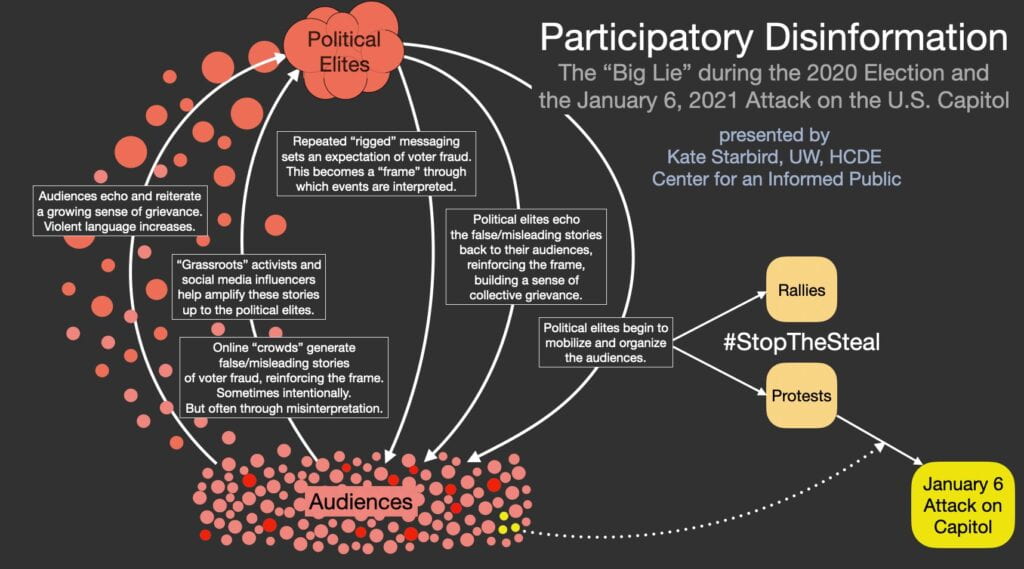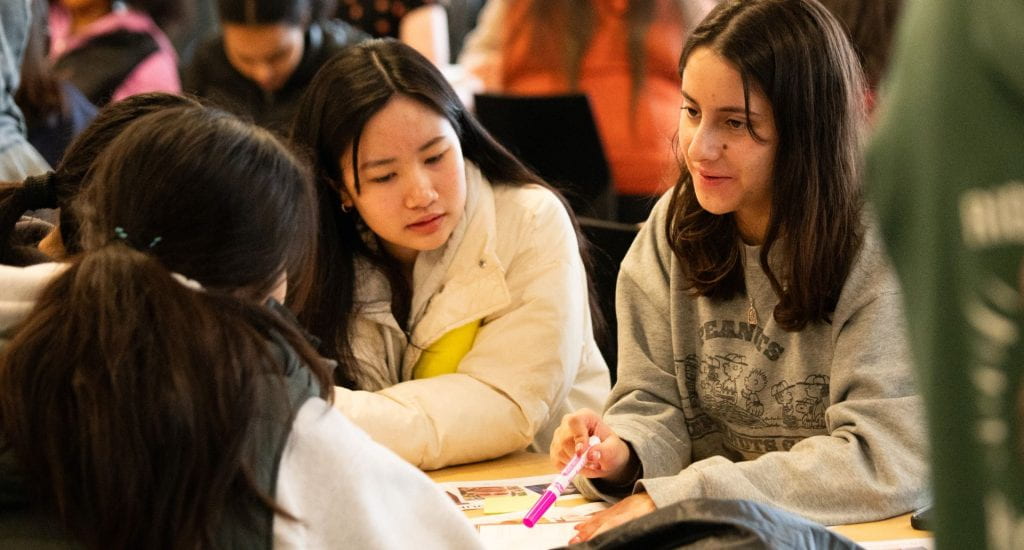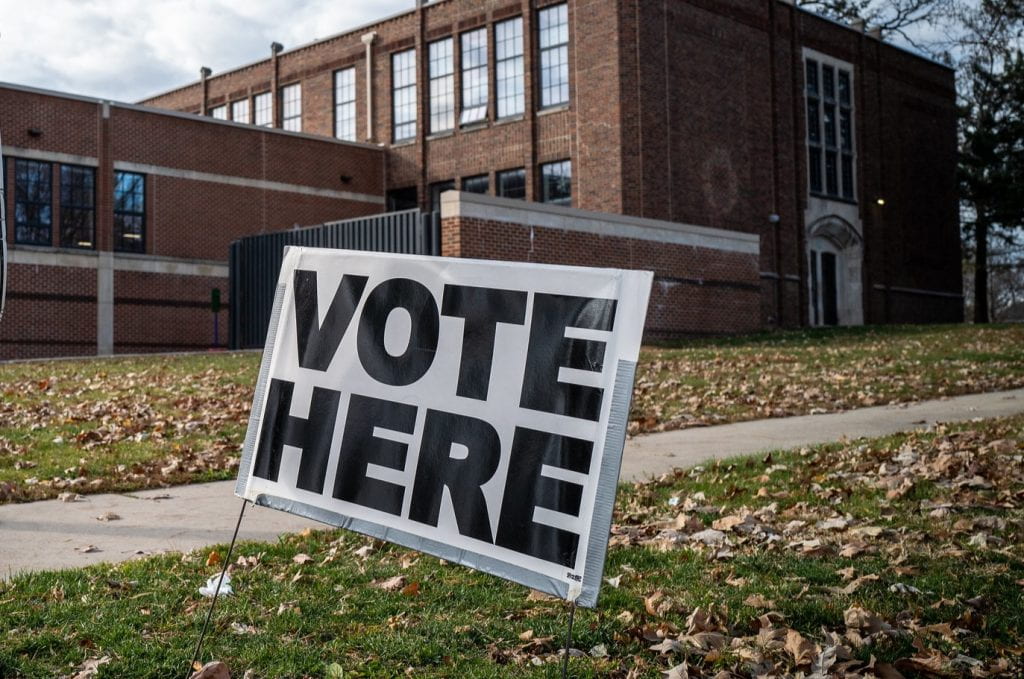This is a web version of the Center for an Informed Public‘s News & Insights newsletter for May 2021, which was sent out on May 26. Check out our newsletter archives. Not signed up to receive the CIP’s newsletter. Sign up here.
What is participatory disinformation?
During a May 4 keynote virtual presentation at the George Washington University Institute for Data, Democracy & Politics, Kate Starbird, a University of Washington Center for an Informed Public co-founder and Human Centered Design & Engineering associate professor, discussed “the notion of participatory disinformation that connects the behaviors of political elites, media figures, grassroots activists, and online audiences to the violence at the Capitol,” as Justin Hendrix of Tech Policy Press wrote of Starbird’s research earlier this month. But what is participatory disinformation? How does it work and what does it look like?
In a May 6 tweet thread, recently featured by The Washington Post and in other media reports, Starbird shared a series of infographics she created as part of her work at the CIP that helps illustrate how participatory disinformation works and how those information dynamics can lead to an event like the insurrection at the U.S. Capitol on Jan. 6, 2021.
EVENTS:
UW iSchool students to present 4 CIP-sponsored Capstone projects on May 27.
// LEARN MORE
PEOPLE:
Digital literacy expert Mike Caulfield named iSchool affiliate instructor, CIP faculty member.
// LEARN MORE
SPOTLIGHT
By auditing algorithms, iSchool researchers work to better understand misinformation we see and consume online
RESEARCH NOTES
Dozens of mis- and disinformation researchers gather for CIP’s half-day research workshop
On May 6, approximately 100 academic and academic-adjacent researchers studying mis- and disinformation participated in a half-day virtual workshop, ” Challenges and Considerations for Misinformation Research,” hosted by the Center for an Informed Public and designed to bring together academic teams in the mis- and disinformation space to share research insights, best practices, challenges and concerns. There were four workshop sessions — research methods; data collection, use, and ethics; communicating findings; and ethics and welfare — and an opportunity for session attendees to share key ideas, themes and challenges that emerged during their discussions with the larger workshop group.
The workshop was hosted under the Chatham House Rule, where “participants are free to use the information received but neither the identity nor affiliation of the speaker(s), nor that of any participant may be revealed.” In the coming weeks, the CIP looks forward to sharing an overview of key themes, ideas, challenges, concerns and opportunities for growth in the field of mis- and disinformation research that emerged from the workshop discussions.
***
The UW iSchool’s Research Symposium series for the current academic year wrapped up this month with a two-part presentation featuring the work of the CIP’s postdoctoral fellows, Joe Bak-Coleman, Kolina Koltai and Rachel E. Moran, who shared insights from their respective ongoing research and the collaborations they have pursued with student researchers working on CIP projects and CIP Directed Research Groups.
***
***
In ” Imagining Resistance to Trump Through the Networked Branding of the National Park Service ,” a chapter in the edited volume Popular Culture and Civic Imagination, Rachel E. Moran , writing with Northwestern University School of Communication assistant professor TJ Billard , explore how internet users co-opt the branding of iconic brands and remix it on social media for participation and protest. Popular Culture and the Civic Imagination won a Best Book Award at the Popular Culture Association ‘s annual conference.
INSIGHTS
CIP, Tech Policy Lab co-host virtual book discussion with Atlas of AI author Kate Crawford
On May 13, UW’s Center for an Informed Public and Tech Policy Lab co-hosted a virtual discussion featuring Kate Crawford, author of the recently released book Atlas of AI: Power, Politics and the Planetary Costs of Artificial Intelligence (Yale University Press, April 2020), and Ryan Calo, a UW School of Law professor, CIP co-founder and Tech Policy Lab faculty co-director.
***
Nicole Buckley, a UW School of Law second-year student and Hazelton Fellow working as an analyst with the CIP, was a featured on a panel discussion that included Washington state Sens. Reuven Carlyle and Doug Ericksen during a May 20 virtual event hosted by Folio Seattle, a nonprofit, member-supported library and cultural center offering cultural and civic conversations. During the discussion, moderated by retired journalist Morton Kondracke, Buckley discussed key findings from the Election Integrity Partnership ‘s “Long Fuse: Misinformation and the 2020 Election” final report, insights on social media platform policy and Section 230 reform.
***
On May 4, Ifeoma Ozoma, the founder and principal of Earthseed, a consulting firm supporting individuals, organizations and companies on issues relating to tech accountability, public policy, health misinformation and related communications, joined the Center for an Informed Public’s weekly Lab meeting for a virtual Q&A with researchers organized as part of the CIP’s ongoing Invited Speaker Series. The series will take a hiatus during Summer Quarter.
CIP IN THE NEWS
CIP’s Koltai: ‘There are multiple ways in which people can promote vaccine hesitancy. It isn’t just manipulated science’
CIP postdoctoral fellow Kolina Koltai, who studies vaccine misinformation, was featured in a recent NBC News article and a National Public Radio “Morning Edition” segment about vaccine misinformation. “There are multiple ways in which people can promote vaccine hesitancy. It isn’t just manipulated science,” she told NBC News. “Their symptoms may be real, but unless you are also talking to their physician, making claims about what caused those issues could be misleading. What we know is that even just the implication that issues are being caused by a vaccine can be enough to create doubt. [NPR; NBC News]
- A recent Federal Trade Commission panel discussion, “Bringing Dark Patterns to Light,” featuring UW School of Law professor and CIP co-founder Ryan Calo was spotlighted in Digiday. “A hundred years ago, that is what Congress told the FTC to do: figure out which practices that companies are doing that are just too unfair to let go. They spoke in very overt, moralistic language about it. And so my hope is that dark patterns is a place that we can begin to reclaim that role for this great commission,” Calo said. [Digiday]
- In a Science News article, “A few simple tricks make fake news stories stick in the brain,” CIP director Jevin West, a UW Information School associate professor and co-author of the 2020 book Calling Bullshit: The Art of Skepticism in a Data-Driven World (Random House, August 2020), said that people “are not only contending with our own cognitive crutches as humans. We’re also contending with a platform, and with algorithms and bots that know how to pierce into our cognitive frailties.” The goal, West told Science News, is “to glue our eyeballs to those platforms.” Their book was also referenced in a Design World feature about how “STEM classes don’t teach engineers how to think.” As Bergstrom and West wrote in their book: “We generally do a good job teaching mechanics: students learn how to manipulate matrices, transfect cells, run genomic scans, and implement machine learning algorithms. But this focus on facts and skills comes at the expense of training and practice in the art of critical thinking.” [Science News; Design World]
- Vice News‘ Motherboard featured a recently released paper co-written by West and UW Department of Biology professor Carl Bergstrom and published in the Proceedings of the National Academy of Sciences that examines misinformation in and about science. “Neither Carl nor I think science is broken,” West said. “We just think there are some ways to further improve it.” [Vice News / Motherboard]




